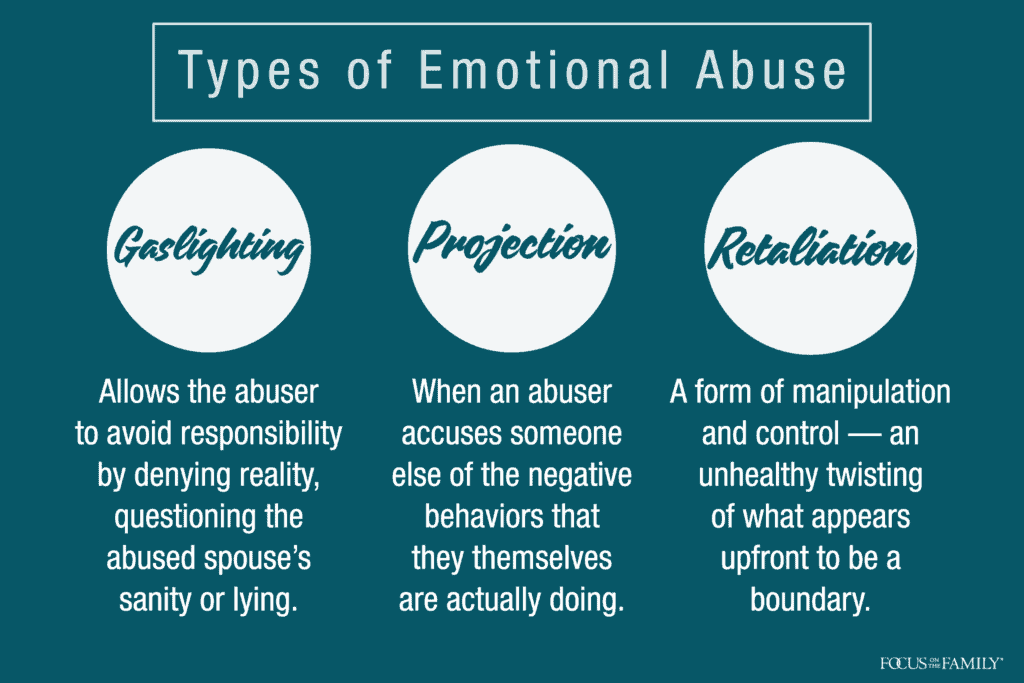Since the Lord rescued me from an emotionally abusive husband a decade ago, I’ve spent countless hours in counseling, prayer and study, learning everything I can about abuse and — even more importantly — how to heal.
God has also used the darker parts of my story to help other women who are in or who recently left an emotionally abusive husband.
The more I learn and encounter others with stories of abuse by an emotionally abusive husband or spouse, the more convinced I become that choosing to seek knowledge and understanding brings God’s help and the power to move forward into health, freedom and life.
The path to seeking knowledge on abuse starts with understanding what abuse is. When those people affected by abuse see the situation more clearly, they are more likely to begin healing from the hurt and to help provide safety information for others.
If you suspect that you or someone you know is in an abusive relationship, go to a safe place and call the National Domestic Violence Hotline at 1-800-799-7233 or visit them online at thehotline.org. Your safety is the most important thing, and they can help you with your situation.
How To Know if It’s an Emotionally Abusive Relationship
Geremy Keeton, senior director of the counseling services department of Focus on the Family, says:
Defining emotional abuse is important. The term “emotional abuse” is too powerful to misuse it in any way. Harm from another person’s selfish mistake or sinful action does not necessarily define abuse. We all cause others emotional pain at times (See James 3:2). And if we were to define everything that is hurtful or even harmful as abuse then we actually detract from the definition of abuse and dilute it. One of the key aspects of emotional abuse is persistent patterns — a system of power and control; a calculated degrading of another person. When this kind of persistent pattern (which includes a purposeful mindset and destructive behaviors) is present, the term “emotional abuse” is accurately used.
In any form, abuse is destructive. However, emotional abuse has been proven to be one of the most damaging types of abuse long term.
In fact, one study looked at survivors of emotional and physical abuse. They found that years after the abuse had ended, the hurtful words and emotional manipulation from an emotionally abusive husband or spouse actually caused lasting damage — even over the physical violence the victims had suffered. An emotionally abusive relationship can also cause long-term mental health challenges, including anxiety, chronic depression, PTSD and more.
Words matter. The Bible tells us that the power of life and death is in the tongue (Proverbs 18:21). Research shows us this is true as well.
Common Types of Emotional Abuse
The reality is that we are all capable of hurting those around us with our words and our actions. We all react out of anger, treat others with disrespect and can try to control the people around us at times. However, when this type of behavior is done repeatedly in a marriage, we need to start asking some hard questions to determine if it’s an emotionally abusive marriage.
In some cases, emotional abuse can be mistaken as benevolent control or innocent influence. Three types of emotional abuse that are hard to identify are gaslighting, retaliation and projecting. Emotional abuse may include threats, insults, isolation and more, but these three types can be some of the hardest to detect.
The following stories are real-life examples that highlight these three types of emotional abuse by an emotionally abusive husband. Each story will not only help you understand the type of abuse but will also help you see how abuse creates a recurring pattern.
Please note that both the names and identifying details of these stories have been changed to protect the victims. Hopefully, each story will help you see the difference between a healthy relationship and an emotionally abusive relationship.
Before We Start, Commit To Make The Call
If after reading the three examples below you’ve gained knowledge, sought understanding and see that emotional abuse is a consistent part of your relationship, it’s time to “make the call” — to get help.
- First, call out to God. Be honest with Him and yourself about what you’re experiencing.
- Second, tell someone else. Talk to your parents if they’re emotionally safe and a supportive source of wisdom for you. Call a trusted friend. Schedule a time to speak with a counselor. Let your situation be known to a pastor. Call the National Domestic Abuse hotline.
But don’t be like the person described in James 1:24, who looks in the mirror and goes away unchanged. Living the same way will never bring change. It’s time to make a call — for yourself or for someone you know. Don’t stay with an emotionally abusive husband or spouse.
Gaslighting
Gaslighting allows the abuser to avoid responsibility by denying reality, questioning the abused spouse’s sanity or lying.
Vanessa had been dating Nate for almost a year before she started to notice some red flags that indicated an emotionally abusive relationship. The main thing that bothered her was how Nate would respond when she’d bring up a past conversation. It started out with small things, like the time that Nate said he would come over to fix her garbage disposal, but didn’t. Problems gradually grew, like the time Nate agreed to pick up Vanessa’s dog from the vet when she had to work late — but he didn’t. Or the time that Nate had promised to take her nephew on a camping trip — but didn’t.
In each of these situations and many others, Nate would tell Vanessa that they “never had that conversation.” When she’d remind him that he’d agreed to do each of those things, Nate would tell Vanessa she was crazy and was making things up because he had “never agreed to do them.”
When Vanessa pressed the issue, it would lead to a huge argument. And Nate was so convincing that, over time, Vanessa actually began to believe that she was forgetful, unable to interpret their conversations accurately or even mentally ill.
As the issues became larger, so did Nate’s abuse and lies.
Vanessa began to write down their conversations, and over the course of a few months, she saw a pattern of her asking Nate to do something and Nate telling her she was crazy, lying to her, calling her names and more.
Thankfully, Vanessa saw the pattern early. When she addressed the problem with Nate, he promised to change — but he knew what he was doing and didn’t want to stop. His behaviors created convenience for him and control over the person he was in a relationship with. Vanessa wasn’t the first to deal with this from him — she found out that two of his ex-girlfriends had similar degrading experiences with him.
Over time the evidence mounted and it became clear to Vanessa that his words and actions didn’t line up, and Nate was making no credible effort for them to — only empty, manipulative promises. He had no intention of changing the pattern, and when his behavior continued to escalate, Vanessa ended the relationship. No underlying medical issues, such as dementia, were affecting Nate. Vanessa was facing unhealthy and destructive heart issues in Nate and choices in response to them that she had to make.
Am I in a Healthy or Emotionally Abusive Relationship?
Gaslighting is an abuser’s attempt to avoid responsibility and intentionally redirect the blame from themselves onto the victim. It’s extremely manipulative and can be very psychologically destructive to the victim.
In a healthy relationship, people tend to own their mistakes and genuinely work to become better. In an emotionally abusive relationship, the abuser refuses to own their willful actions and hurtful reactions and doesn’t want to change their behaviors. Their goal is to control rather than work things out in a healthy way.
Questions To Ask Yourself:
- Does my spouse or significant other repeatedly deny conversations we’ve had?
- Does my spouse continually refuse to take responsibility when they’ve made a mistake or hurt my feelings?
- Do I often feel afraid or hesitant to bring up issues to my spouse?
- Does my spouse continually make me feel like, or even tell me, things are always my fault?
Make A Call
If you answered “yes” to more than two of the questions above, that’s a good indicator that gaslighting may be happening in your relationship, resulting in an emotionally abusive marriage — and it’s time to make a call.
Retaliation
Retaliation can come in many types, but in its most basic form, it’s an abuser saying, “If you do ‘X’, then I will do ‘Y.’ ” At its core, retaliation is about punishment. It’s a form of manipulation and control — or an unhealthy twisting of what appears upfront to be a boundary. But really retaliation is someone implying, “If you do something I don’t want you to do, I will punish you for it — and it will hurt (emotionally or physically).”
It can include punishing a victim for doing something the abuser said not to do. In an emotionally abusive relationship, retaliation can be used to keep victims silent, keep them from seeing loved ones or force victims to do things they don’t want to do.
Penny was very close with her three best friends from college. However, after she married Rob, he began to put distance between her and those relationships.
At first, when she would talk about seeing her friends, Rob would suggest that he and Penny should spend time together instead. Being newlyweds, Penny thought it was sweet that he wanted to spend so much time with her. But after six months, when Penny began to tell Rob that she really needed time with her friends, his manipulation began to escalate.
The first sign of retaliatory manipulation came when he told her she could go to lunch. But when she came home a few hours later, he made her feel guilty for leaving and they had a huge argument.
The next sign of an emotionally abusive husband came when he texted her nearly the entire time she was out and became furious if she didn’t reply right away. Again, when she arrived home, he told her if she really loved him, she wouldn’t have gone, which led to a disagreement.
The third time, Rob told her she could go, but if she did, he would go to a strip club with some friends from work since he was alone and lonely — it was his right since her job was to be with him and not other people.
Penny couldn’t believe that Rob would even say that — let alone follow through on it. It seemed so far out of character from the man she’d married. But after she met with her friends, she came home to an empty house. Rob came home the next morning — having more than followed through on his threat.
After that, Penny didn’t ask to go out with her friends anymore.

Am I in a Healthy or Emotionally Abusive Relationship?
As you can see, each time Penny didn’t do what Rob said, he retaliated and increased her “punishment,” until Penny finally stopped challenging him. While Rob’s controlling actions may seem extreme, many abusers (especially over time) don’t have a “ceiling” for how high they will go to maintain domination.
In many cases, retaliation is designed to hurt the victim where they’re most vulnerable. In an emotionally abusive marriage, abusers prey on a victim’s fears and often tell them that “if they really loved them,” they wouldn’t do something that would “hurt them so much.” They may even threaten them, their pets or the people they love — even if what the victim wants to do is relationally healthy, like going to lunch with friends.
In an emotionally abusive relationship, retaliation creates fear. In a healthy relationship, “perfect love casts out fear” (1 John 4:18) and there should be a level of safety to do healthy things and to not be punished.
Questions To Ask:
- Does my spouse often threaten to hurt me emotionally, physically or sexually if I don’t do what they ask?
- Am I afraid to tell my spouse how I feel or what I want?
- If I do something my spouse doesn’t agree with, do they find a way to hurt me emotionally, physically or sexually or excuse their own negative or immoral reactions by blaming me?
- Have I stopped choosing healthy decisions because I’m afraid of how my spouse will respond?
Make The Call:
If you answered “yes” to any of the questions above, it’s time to take a look at the red flags that may show an emotionally abusive marriage. A healthy relationship involves mutual respect, not retaliation. It’s time to make a call.

Talk to a Counselor
Reach a counselor toll-free at 1-855-771-HELP (4357).
Projection
Projection is when an abuser accuses someone else of the negative behaviors that they themselves are actually doing.
Kyle’s college girlfriend had cheated on him. While his wife, Brittany, knew that Kyle had some lingering insecurity due to this experience, she couldn’t understand why Kyle would continually accuse her of cheating on him.
He’d check her phone, texts and email repeatedly, often picking apart emails that her male boss, Ben, had sent her. He’d tell her that no boss “would ever talk to a co-worker like that unless something more was going on,” even though the emails were purely professional. One day, she and Kyle had an altercation after he found out she had attended lunch with her team of seven people at work. Kyle told her that it was probably just her and Ben, and that she was lying about who was really there.
Brittany did everything she could to assure Kyle that nothing was going on, but no matter what she did, he wouldn’t believe the truth. When she became angry, he’d blame his past or tell her that her anger was a sign she truly was cheating on him. He even told Brittany that if she really loved him and wasn’t cheating on him, she’d quit her job. When Brittany refused to quit, he’d tell her it was further proof that she was cheating. He’d often follow that up with coarse language and insults about “what kind of woman she was.”
Kyle also began to require that Brittany have his approval for every outfit she wore before leaving the house. If she weren’t covered from head to toe, Kyle would call her a nasty name and say she was “looking for the wrong kind of attention.” He even wanted her to stop wearing makeup.
One night, while they were out on a dinner date, Kyle saw another man looking at Brittany. When he pointed it out, Brittany waved it off and tried to focus back on their date night. But Kyle exploded. He left the restaurant, taking the car and Brittany’s purse with him. Brittany was forced to navigate her own way home. When she finally arrived back at home, Kyle apologized and said he “trusted her after all.” Their relationship formed into an emotionally abusive marriage over time, but Kyle was an emotionally abusive husband from the start.
Several months later, Brittany found out that Kyle had been cheating on her with a woman he’d met at work.
Am I in a Healthy or Emotionally Abusive Relationship?
While Kyle and Brittany’s story may sound extreme, it’s all too common. Kyle was projecting as well as abusive in other ways. In each story, you can see multiple forms of abuse present.
We all struggle at times with insecurity, but Kyle used his insecurity as an excuse to not only control Brittany but also to deal with his shame over his affair.
Although the affair is clearly a problem, Kyle’s patterns that eventually resulted in an emotionally abusive marriage are, too. Healthy relationships look a lot more like the emotions described in 1 Corinthians 13:4-8:
Love is patient and kind; love does not envy or boast; it is not arrogant or rude. It does not insist on its own way; it is not irritable or resentful; it does not rejoice at wrongdoing, but rejoices with the truth. Love bears all things, believes all things, hopes all things, endures all things. Love never ends.
Questions To Ask:
- Does my spouse repeatedly accuse me of doing things that I’m not doing?
- Does my spouse act in ways that hurt, isolate or disrespect me and excuse their behavior by blaming their own insecurities?
- Does my spouse continue to use their own past against me or tell me that I’m just like other people who have hurt them in the past?
- Does my spouse try to use past events or personal insecurities to control me or keep me from doing things?
- Does my spouse become angry or violent when members of the opposite sex speak to me or look at me? Does my spouse accuse me of trying to get someone else’s attention by the way I look, dress or act?
Make The Call:
If you answered “yes” to the questions above, there’s a good chance that you’re in an emotionally abusive relationship where projection is present — and it’s time to make a call.
Final Thoughts on These Destructive Patterns
Gaslighting, retaliation, and projection are three forms of emotional abuse that can be hard for victims to fully recognize and learn to respond to. However, there are also more obvious types in an emotionally abusive marriage where you should “make the call.” These include threats, insults, dramatically controlling finances or forbidding contact with loved ones.
If you’ve already answered the series of questions above, you should have a pretty clear idea if your husband is emotionally abusive or you’re in an emotionally abusive relationship. Even if you answered “no,” here are some general guidelines that can help you or someone you love pinpoint red flags:
- It’s abusive when the harmful and degrading behaviors are a pattern. Healthy people apologize and work to change; they don’t continue to hurt someone again and again.
- It’s abusive when the motivation is to destroy or injure another person emotionally, physically or spiritually.
- It’s abusive when punishment is involved.
- It’s abusive when boundaries aren’t acknowledged and respected.
- It’s abusive if fear is present and capitalized upon by the abuser. If you’re afraid of your spouse, their reactions or what they will do from day-to-day, you’re likely in an emotionally abusive marriage.
- It’s abusive if you or others are being threatened.
If any of these are what you or someone you know is experiencing, it’s time to “make the call.”
God stepped in and rescued me from an emotionally abusive husband. But it all began when I cried out to Him and asked Him for the “truth” that set me free. And He can set you free too.
















